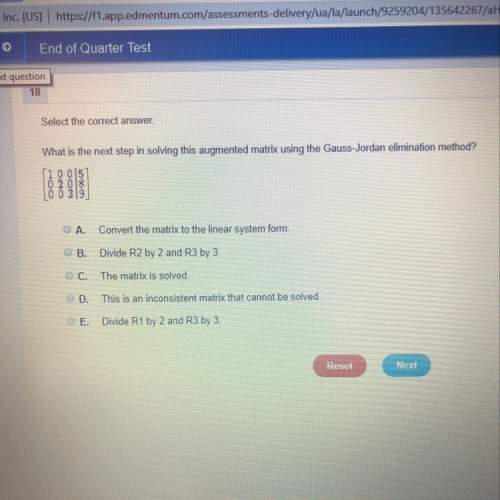
Mathematics, 06.03.2020 20:15 jakobcook7pdvy6d
5.4.2 Define a sequence (cn) [infinity] n=0 as follows: ( cn+1 = 49 8 cn − 225 8 cn−2, n ≥ 2, c0 = 0, c1 = 2, c2 = 16. Prove that cn = 5 n − 3 n for all n ∈ N0. Hint: you need three base cases!

Answers: 1


Another question on Mathematics

Mathematics, 21.06.2019 13:20
What additional information could be used to prove that δxyz ≅ δfeg using asa or aas? check all that apply. ∠z ≅ ∠g and xz ≅ fg ∠z ≅ ∠g and ∠y ≅ ∠e xz ≅ fg and zy ≅ ge xy ≅ ef and zy ≅ fg ∠z ≅ ∠g and xy ≅ fe
Answers: 2

Mathematics, 21.06.2019 18:40
Offering 30 if a plus b plus c equals 68 and ab plus bc plus ca equals 1121, where a, b, and c are all prime numbers, find the value of abc. the answer is 1978 but i need an explanation on how to get that.
Answers: 3

Mathematics, 21.06.2019 20:00
A. what does the point (4, 122) represent? b. what is the unit rate? c. what is the cost of buying 10 tickets?
Answers: 2

Mathematics, 21.06.2019 22:00
Here is my question! jayne is studying urban planning and finds that her town is decreasing in population by 3% each year. the population of her town is changing by a constant rate.true or false?
Answers: 2
You know the right answer?
5.4.2 Define a sequence (cn) [infinity] n=0 as follows: ( cn+1 = 49 8 cn − 225 8 cn−2, n ≥ 2, c0 = 0...
Questions

Mathematics, 23.04.2021 18:30

Mathematics, 23.04.2021 18:30





Mathematics, 23.04.2021 18:30



Mathematics, 23.04.2021 18:30



Mathematics, 23.04.2021 18:30


Physics, 23.04.2021 18:30

Mathematics, 23.04.2021 18:30


Mathematics, 23.04.2021 18:30





